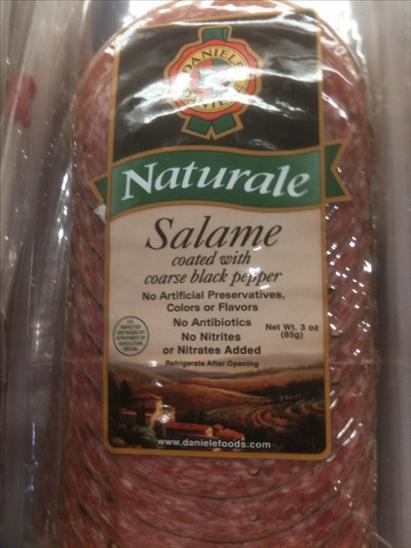The Providence Journal ran a feature Sunday about how a outbreak of Salmonella Montevideo in Daniele sausage that sickened 272 people in 44 states and was linked to black pepper imported from Vietnam. The investigation unearthed a few .jpg) other surprises along the way, highlighting the challenges of an epidemiological investigation.
other surprises along the way, highlighting the challenges of an epidemiological investigation.
Primarily, it reinforces the coda, know thy suppliers. Excerpts below:
On a gray Friday last January, three representatives of the Rhode Island Office of Food Protection drove down a long driveway to a sprawling white building, a meat-processing plant in the backwoods of Burrillville.
They were making an unannounced visit — a surprise in more ways than one — to the headquarters of Daniele Inc., a company that for 34 years has been producing millions of pounds of dry-cured sausage. Daniele favors a low profile.
The place doesn’t even have a sign.
From the car, the inspectors telephoned Michael DeCesare, Daniele’s director of food safety, and told him that Daniele was “a company of interest” in a nationwide outbreak of salmonella.
DeCesare was flabbergasted. For one thing, salmonella is usually associated with chicken and eggs, not beef or pork. For another, he knew all the steps Daniele takes to ensure its meat is safe.
A 10-week investigation would prove him right, but not before following twists and turns so unlikely that Ernest M. Julian, Rhode Island’s chief of food inspection, wondered at one point if the contamination were an act of terrorism.
With over 100 people sick, Kathryn MacDonald, an epidemiologist with the Washington Department of Health, noticed that seven of the victims in her state .jpg) shopped at Costco. The state asked them for permission to check the records of their purchases through their shopper’s cards. Now the investigators didn’t have to rely on anyone’s memory.
shopped at Costco. The state asked them for permission to check the records of their purchases through their shopper’s cards. Now the investigators didn’t have to rely on anyone’s memory.
“It was just lucky that the product happened to be purchased consistently in a single chain [store] that kept records,” MacDonald said.
The records revealed one item that five of the seven Costco-shopping victims had purchased: Daniele Italian Brand Gourmet Pack, made in Burrillville.
The Gourmet Pack included only pepper-coated salami. The meat itself goes through a curing process that kills harmful bacteria. Then it is rolled in fat heated to 160 degrees, hot enough to kill any bacteria in the fat. Only after all these “kill steps” is the salami rolled in pepper. Most people eat it out of the package, uncooked.
The possibility that pepper could be carrying disease was unnerving. Pepper, imported from Asian farmlands, is something that almost everyone eats, often without knowing it –– in the seasonings of a restaurant chef or as an ingredient in packaged foods, where it is often identified only as “spices.”
Salmonella was found in black pepper from two different wholesalers that supplied Daniele –– Mincing Overseas Spice Co. and Wholesome Spice and Seasonings. Both were buying from Vietnam, but from different farms.
Then came a curve ball. A Daniele variety pack bought in Iowa tested positive for the outbreak strain. It contained “capocollo” that had been rolled in ground red pepper. It turns out that black pepper wasn’t the only spice applied after the “kill steps.” .jpg) Tests began on ground red pepper.
Tests began on ground red pepper.
In early February, Daniele was preparing to resume operations at two factories when another curve ball hit: Someone in Minnesota got sick after eating a Daniele product called “panino” — salami rolled in mozzarella and sprinkled with crushed red pepper. The panino was made at the third plant, the one that was never shut down, and never a focus of the investigation, because no ground pepper was used there.
And the crushed red pepper came from India and China, not Vietnam.
The situation was getting bizarre. There were two importers. Three countries of origin. Three types of pepper (ground black, ground red, crushed red) –– all containing salmonella Montevideo with the exact same genetic fingerprint as the bacteria that made people sick. What’s more, all the contaminated pepper had so far been found in one place: Daniele.
To make sure this never happens again, Daniele took the extraordinary step of installing a permanent laboratory in a trailer next to the factory. The laboratory tests the ingredients, the meat at various stages of production and the finished products –– a “multiple hurdle approach” that exceeds USDA requirements.

 Five days after Daniele’s initial recall of all black-pepper coated salami products on January 23/10, tests by the Rhode Island Department of Health found the outbreak strain of Salmonella Montevideo in an open container of black pepper used to coat salami products. On Jan. 29/10, I found a 3oz. package of the shredded product on store shelves in Minneapolis. Daniele had not listed this product on their initial recall list. For some reason, Daniele Inc. had decided that this product was still safe to sell to adults and children even after every other black-pepper coated product was recalled and a test of the company’s black pepper returned positive for Salmonella.
Five days after Daniele’s initial recall of all black-pepper coated salami products on January 23/10, tests by the Rhode Island Department of Health found the outbreak strain of Salmonella Montevideo in an open container of black pepper used to coat salami products. On Jan. 29/10, I found a 3oz. package of the shredded product on store shelves in Minneapolis. Daniele had not listed this product on their initial recall list. For some reason, Daniele Inc. had decided that this product was still safe to sell to adults and children even after every other black-pepper coated product was recalled and a test of the company’s black pepper returned positive for Salmonella. Henke (left, exactly as shown) is an avid fan of foodborne disease epidemiology and food safety, and spends most of his free time angering his friends with his interest in food production and careful scrutiny of food safety practices.
Henke (left, exactly as shown) is an avid fan of foodborne disease epidemiology and food safety, and spends most of his free time angering his friends with his interest in food production and careful scrutiny of food safety practices. has announced they are recalling 1.2 million pounds of products, including pepper-coated salami, as a result of the outbreak. Preliminary results from health authorities indicate that eleven ill individuals had consumed salami products from “Daniele Italian Brand Gourmet Pack.”
has announced they are recalling 1.2 million pounds of products, including pepper-coated salami, as a result of the outbreak. Preliminary results from health authorities indicate that eleven ill individuals had consumed salami products from “Daniele Italian Brand Gourmet Pack.”